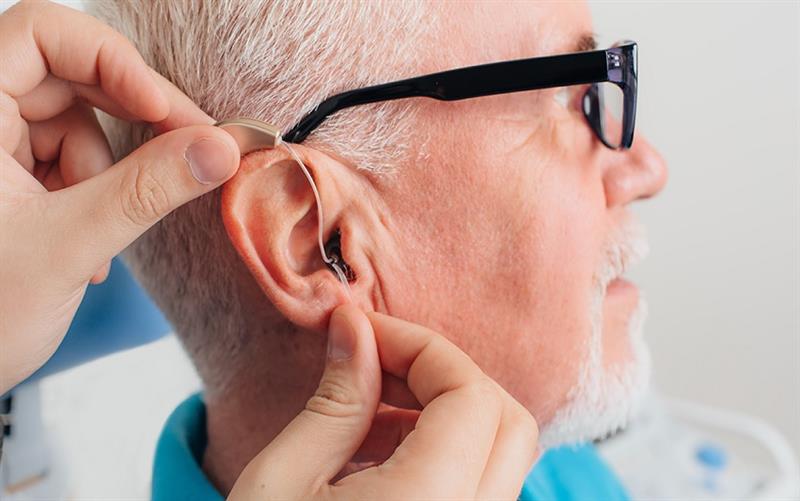
For elderly people, hearing is a vital sense that keeps them connected to the outside world. Hearing aids play a vital part in maintaining mental, emotional, and physical health by enhancing hearing. They assist elderly people in preserving their independence, keeping in touch with loved ones, and avoiding the health hazards linked to hearing loss.
Eliminating the stigma associated with hearing aids and emphasizing the value of good hearing health are critical as our society ages. Seniors are given the ability to completely embrace life and age with dignity, grace, and joy when we do this.
A multitude of changes accompany aging; some are expected, such as graying hair or slower movement, while others, like hearing loss, can take us off guard. Gradual hearing loss affects many seniors and can have a negative effect on their general quality of life, mental stability, and health. However, hearing loss is frequently disregarded, viewed as merely another indication of age rather than a disease deserving of medical attention and treatment. This is where hearing aids come into play; by helping millions of people hear again and re-establish their connection to the outside world, they can change their lives.
The Health Impacts of Untreated Hearing Loss
Untreated hearing loss can cause a number of health issues in addition to being an annoyance.
1. Cognitive Decline: Studies have demonstrated a direct connection between hearing loss and cognitive decline, which includes a higher chance of dementia. Cognitive abilities may suffer as a result of the brain having to work harder to process sound when hearing declines. For seniors in particular, this is crucial because their capacity to live independently is strongly correlated with their cognitive health.
2. Depression and Social Isolation: Seniors who experience communication difficulties tend to retreat from social interactions. They may grow frustrated having conversations in crowded areas or on the phone and stop participating in social events entirely. Depression and anxiety can damage general health and well-being, and this isolation might set them up.
3. Increased Risk of Falls: Research has indicated that seniors with hearing loss are at a higher risk of falling since hearing is connected to balance. Hearing loss is a major risk factor for falls, which are the primary cause of injury and death among older individuals, according to the Centers for Disease Control and Prevention (CDC).
4. Cardiovascular Health: Interestingly, there is a connection between poor cardiovascular health and hearing loss. Hearing can be impacted by problems with the cardiovascular system since the inner ear is sensitive to blood flow. As a result, treating hearing loss may also have unintended advantages for heart health.
How Hearing Aids Enhance Senior Well-Being
Hearing devices for seniors have the power to completely change the aging process—far beyond just improving hearing. Here's how to do it:
1. Better Communication: Seniors can hear TV, music, conversations, and more with the help of hearing aids, which primarily enhance sound. Seniors who use hearing aids are able to have more conversations with friends, family, and caretakers and are less likely to become socially isolated.
2. Improved Cognitive Function: Research has indicated that the use of hearing aids can help stave off cognitive aging. Hearing aids lessen the cognitive burden on the brain, preserving its function and sharpness by improving the brain's ability to process sound.
3. Improved Emotional Well-Being: Embarrassment and frustration are common reactions to hearing loss. Elderly people could feel misinterpreted or cut off from society. They can participate in things they used to like, reclaim their confidence, and reestablish relationships with loved ones by donning hearing aids.
4. Safety and Self-reliance: Maintaining good hearing is essential to remaining safe. Seniors with hearing aids are more likely to keep their independence and prevent mishaps, from hearing fire alarms to staying alert of their surroundings when crossing the street.
5. Enhanced Mobility and Balance: Improving hearing can lower the risk of falls because it is connected to balance. Seniors are more likely to remain active and mobile, improving their physical health and quality of life, if they have improved balance and spatial awareness.
Overcoming Stigma and Barriers to Hearing Aid Use
Even with the advantages, a lot of seniors are reluctant to utilize hearing aids. Some people view wearing hearing aids as a sign of aging, which makes them feel ashamed to use them. Some might be worried about the price or if they actually need them. However, these obstacles can be surmounted with the help of accessible solutions, knowledge, and education.
1. New Technologies: Today's unobtrusive and sophisticated hearing aids are better than ever. Many of them have Bluetooth capability, which lets users connect their hearing aids to TVs, phones, and other devices. They are made to be nearly unnoticeable.
2. Affordability: Although hearing aids can be costly, there are insurance plans and programs that may assist defray some or all of the expenditures. It's critical that elderly people and their families consider every possibility.
3. Frequent tests: Just like eye exams or blood pressure checks, regular hearing tests have to be a part of every senior's healthcare regimen. Early detection of hearing loss facilitates the selection of the most appropriate course of action and helps to avert more difficulties.
It's ideal to keep yourself as educated with your hearing aids and a new breakthrough in the technology. Ask your query via Book an Appointment today. For more information visit https://hearing.careinc.ca or you can call us today at (403)605-6300